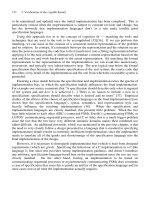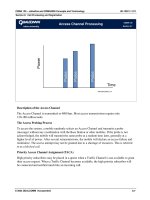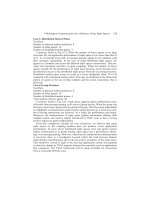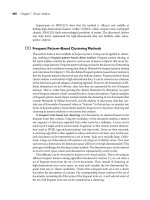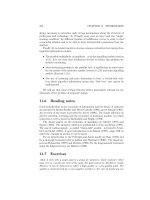Economic Policy Thoughts for Today and Tomorrow phần 7 ppsx
Bạn đang xem bản rút gọn của tài liệu. Xem và tải ngay bản đầy đủ của tài liệu tại đây (837.2 KB, 12 trang )
60 ECONOMIC POLICY
And they are buying from other people who are manu-
facturing and selling the commodities that these muni-
tions makers want.
These other people form a second group. And this
second group considers inflation to be very good for
business. Why not? Isn't it wonderful to sell more? For
example, the owner of a restaurant in the neighborhood
of a munitions factory says: "It is really marvelous! The
munitions workers have more money; there are many
more of them now than before; they are all patronizing
my restaurant; I am very happy about it." He does not
see any reason to feel otherwise,.
The situation is this: those people to whom the money
comes first now have a higher income, and they can still
buy many commodities and services at prices which cor-
respond to the previous state of the market, to the condi-
tion that existed on the eve of inflation. Therefore, they
are in a very favorable position. And thus inflation con-
tinues step by step, from one group of the population to
another. And all those to whom the additional money
comes at the early state of inflation are benefited because
they are buying some things at prices still corresponding
to the previous stage of the the exchange ratio between
money and commodities.
But there are other groups in the population to whom
this additional money comes much, much later. These
people are in an
unfavorable
position. Before the addi-
tional money comes to them they are forced to pay
higher prices than they paid before for some—or for
practically all—of the commodities they wanted to pur-
chase, while their income has remained the same, or has
not increased proportionately with prices.
Consider for instance a country like the United States
during the Second World War; on the one hand, inflation
Inflation 61
at that time favored the munitions workers, the muni-
tions industries, the manufacturers of guns, while on the
other hand it worked against other groups of the popula-
tion. And the ones who suffered the greatest disadvan-
tages from inflation were the teachers and the ministers.
As you know, a minister is a very modest person who
serves God and must not talk too much about money.
Teachers, likewise, are dedicated persons who are sup-
posed to think more about educating the young than
about their salaries. Consequently, the teachers and min-
isters were among those who were most penalized by
inflation, for the various schools and churches were the
last to realize that they must raise salaries. When the
church elders and the school corporations finally discov-
ered that, after all, one should also raise the salaries of
those dedicated people, the earlier losses they had suf-
fered still remained.
For a long time, they had to buy less than they did
before, to cut down their consumption of better and
more expensive foods, and to restrict their purchase of
clothing—because prices had already adjusted upward,
while their incomes, their salaries, had not yet been
raised. (This situation has changed considerably today,
at least for teachers.)
There are therefore always different groups in the
population being affected differently by inflation. For
some of them, inflation is not so bad; they even ask for
a continuation of it, because they are the first to profit
from it. We will see, in the next lecture, how this uneven-
ness in the consequences of inflation vitally affects the
politics that lead toward inflation.
Under these changes brought about by inflation, we
have groups who are favored and groups who are di-
rectly profiteering. I do not use the term ''profiteering"
62 ECONOMIC POLICY
as a reproach to these people, for ii there is someone to
blame, it is the government that established the inflation.
And there are always people who favor inflation, because
they realize what is going on sooner than other people
do.
Their special profits are due to the fact that there
will necessarily be unevenness in the process of inflation.
The government may think that inflation—as a
method of raising funds—is better than taxation, which
is always unpopular and difficult. In many rich and
great nations, legislators have often discussed, for
months and months, the various forms of new taxes that
were necessary because the parliament had decided to
increase expenditures. Having discussed various meth-
ods of getting the money by taxation, they finally de-
cided that perhaps it was better to do it by inflation.
But of course, the word "inflation" was not used. The
politician in power who proceeds toward inflation does
not announce: "I am proceeding toward inflation." The
technical methods employed to achieve the inflation are
so complicated that the average citizen does not realize
inflation has begun.
One of the biggest inflations in history was in the
German Reich after the First World War. The inflation
was not so momentous during the war; it was the infla-
tion
after
the war that brought about the catastrophe. The
government did not say: "We are proceeding toward
inflation." The government simply borrowed money
very indirectly from the central bank. The government
did not have to ask how the central bank would find and
deliver the money. The central bank simply printed it.
Today the techniques for inflation are complicated by
the fact that there is checkbook money. It involves an-
other technique, but the result is the same. With the
stroke of a pen, the government creates fiat money, thus
Inflation 63
increasing the quantity of money and credit. The govern-
ment simply issues the order, and the fiat money is there.
The government does not care, at first, that some peo-
ple will be losers, it does not care that prices will go up.
The legislators say: "This is a wonderful system!" But
this wonderful system has one fundamental weakness:
it cannot last. If inflation could go on forever, there
would be no point in telling governments they should
not inflate. But the certain fact about inflation is that,
sooner or later, it must come to an end. It is a policy that
cannot last.
In the long run, inflation comes to an end with the
breakdown of the currency; it comes to a catastrophe, to
a situation like the one in Germany in 1923. On August
1,
1914, the value of the dollar was four marks and
twenty pfennigs. Nine years and three months later, in
November 1923, the dollar was pegged at 4.2 trillion
marks.
In other words, the mark was worth nothing. It
no longer had any value.
Some years ago, a famous author, John Maynard
Keynes, wrote: "In the long run we are all dead." This
is certainly true, I am sorry to say. But the question is,
how short or long will the short run
be?
In the eighteenth
century there was a famous lady, Madame de Pompa-
dour, who is credited with the dictum: "Apr&s nous le
deluge" ("After us will come the flood"). Madame de
Pompadour was happy enough to die in the short run.
But her successor in office, Madame du Barry, outlived
the short run and was beheaded in the long run. For
many people the "long run" quickly becomes the "short
run"—and the longer inflation goes on the sooner the
"short run."
How long can the short run last? How long can a
central bank continue an inflation? Probably as long as
64 ECONOMIC POLICY
people are convinced that the government, sooner or
later, but certainly not too late, will stop printing money
and thereby stop decreasing the value of each unit of
money.
When people no longer believe this, when they realize
that the government will go on and on without any in-
tention of stopping, then they begin to understand that
prices tomorrow will be higher than they are today.
Then they begin buying at any price, causing prices to
go up to such heights that the monetary system breaks
down.
I refer to the case of Germany, which the whole world
was watching. Many books have described the events
of that time. (Although I am not a German, but an Aus-
trian, I saw everything from the
inside:
in Austria, condi-
tions were not very different from those in Germany;
nor were they much different in many other European
countries.) For several years, the German people be-
lieved that their inflation was just a temporary affair,
that it would soon come to an end. They believed it for
almost nine years, until the summer of 1923. Then, fi-
nally, they began to doubt. As the inflation continued,
people thought it wiser to buy anything available, in-
stead of keeping money in their pockets. Furthermore,
they reasoned that one should not give loans of money,
but on the contrary, that it was a very good idea to be a
debtor. Thus inflation continued feeding on
itself.
And it went on in Germany until exactly November 20,
1923.
The masses had believed inflation money to be real
money, but then they found out that conditions had
changed. At the end of the German inflation, in the fall
of 1923, the German factories paid their workers every
morning in advance for the day. And the workingman
who came to the factory with his wife, handed his
Inflation 65
wages—all the millions he got—over to her immediately.
And the lady immediately went to a shop to buy some-
thing, no matter what. She realized what most people
knew at that time—that overnight, from one day to an-
other, the mark lost 50% of its purchasing power.
Money, like chocolate in a hot oven, was melting in the
pockets of the people. This last phase of German infla-
tion did not last long; after a few days, the whole night-
mare was over: the mark was valueless and a new cur-
rency had to be established.
Lord Keynes, the same man who said that in the long
run we are all dead, was one of a long line of inflationist
authors of the twentieth century. They all wrote against
the gold standard. When Keynes attacked the gold stan-
dard, he called it a "barbarous relic/' And most people
today consider it ridiculous to speak of a return to the
gold standard. In the United States, for instance, you are
considered to be more or less a dreamer if you say:
"Sooner or later, the United States will have to return to
the gold standard/
7
Yet the gold standard has one tremendous virtue: the
quantity of money under the gold standard is indepen-
dent of the policies of governments and political parties.
This is its advantage. It is a form of protection against
spendthrift governments. If, under the gold standard, a
government is asked to spend money for something
new, the minister of finance can say: "And where do I
get the money? Tell me, first, how I will find the money
for this additional expenditure."
Under an inflationary system, nothing is simpler for
the politicians to do than to order the government print-
ing office to provide as much money as they need for
their projects. Under a gold standard, sound government
has a much better chance; its leaders can say to the peo-
66 ECONOMIC POLICY
pie and to the politicians: "We can't do it unless we
increase taxes."
But under inflationary conditions, people acquire the
habit of looking upon the government as an institution
with limitless means at its disposal: the state, the govern-
ment, can do anything. If, for instance, the nation wants
a new highway system, the government is expected to
build it. But where will the government get the money?
One could say that in the United States today—and
even in the past, under McKinley—the Republican party
was more or less in favor of sound money and of the
gold standard, and the Democratic party was in favor
of inflation, of course not a paper inflation, but a silver
inflation.
It was, however, a Democratic president of the United
States,
President Cleveland, who at the end of the 1880s
vetoed a decision of Congress, to give a small sum—
about $10,000—to help a community that had suffered
some disaster. And President Cleveland justified his veto
by
writing:
"While it is the duty of the citizens to support
the government, it is not the duty of the government to
support the citizens." This is something which every
statesman should write on the wall of his office to show
to people who come asking for money.
I am rather embarrassed by the necessity to simplify
these problems. There are so many complex problems
in the monetary system, and I would not have written
volumes about them if they were as simple as I am de-
scribing them here. But the fundamentals are precisely
these: if you increase the quantity of money, you bring
about the lowering of the purchasing power of the
monetary unit. This is what people whose private affairs
are unfavorably affected do not like. People who do not
benefit from inflation are the ones who complain.
Inflation 67
If inflation is bad and if people realize it, why has it
become almost a way of life in all countries? Even some
of the richest countries suffer from this disease. The
United States today is certainly the richest country in the
world, with the highest standard of living. But when you
travel in the United States, you will discover that there
is constant talk about inflation and about the necessity
to stop it. But they only talk; they do not act.
To give you some facts: after the First World War,
Great Britain returned to the prewar gold parity of the
pound. That is, it revalued the pound upward. This in-
creased the purchasing power of every worker's wages.
In an unhampered market the nominal money wage
would have fallen to compensate for this and the work-
ers'
real
wage would not have suffered. We do not have
time here to discuss the reasons for this. But the unions
in Great Britain were unwilling to accept an adjustment
of money wage rates downward as the purchasing
power of the monetary unit rose. Therefore real wages
were raised considerably by this monetary measure. This
was a serious catastrophe for England, because Great
Britain is a predominantly industrial country that has to
import its raw materials, half-finished goods, and food
stuffs in order to live, and has to export manufactured
goods to pay for these imports. With the rise in the inter-
national value of the pound, the price of British goods
rose on foreign markets and sales and exports declined.
Great Britain had, in effect, priced itself out of the world
market.
The unions could not be defeated. You know the
power of a union today. It has the right, practically the
privilege, to resort to violence. And a union order is,
therefore, let us say, not less important than a govern-
ment decree. The government decree is an order for the
68 ECONOMIC POLICY
enforcement of which the enforcement apparatus of the
government—the police—is ready. You must obey the
government decree, otherwise you will have difficulties
with the police.
Unfortunately, we have now, in almost all countries
all over the world, a second power that is in a position
to exercise force: the labor unions. The labor unions de-
termine wages and then strike to enforce them in the
same way in which the government might decree a mini-
mum wage rate. I will not discuss the union question
now; I shall deal with it later. I only want to establish
that it is the union policy to raise wage rates
above
the
level they would have on an unhampered market. As a
result, a considerable part of the potential labor force can
be employed only by people or industries that are pre-
pared to suffer losses. And, since businesses are not able
to keep on suffering losses, they close their doors and
people become unemployed. The setting of wage rates
above the level they would have on the unhampered
market always results in the unemployment of a consid-
erable part of the potential labor force.
In Great Britain, the result of high wage rates enforced
by the labor unions was lasting unemployment, pro-
longed year after year. Millions of workers were unem-
ployed, production figures dropped. Even experts were
perplexed. In this situation the British government made
a move which it considered an indispensable, emergency
measure: it
devalued
its currency.
The result was that the purchasing power of the
money wages, upon which the unions had insisted, was
no longer the same. The real wages, the commodity
wages,
were reduced. Now the worker could not buy as
much as he had been able to buy before, even though the
Inflation 69
nominal wage rates remained the same. In this way, it
was thought,
real
wage rates would return to free market
levels and unemployment would disappear.
This measure—devaluation—was adopted by various
other countries, by France, the Netherlands, and Bel-
gium. One country even resorted twice to this measure
within a period of one year and a
half.
That country was
Czechoslovakia. It was a surreptitious method, let us
say, to thwart the power of the unions. You could not
call it a real success, however.
After a few years, the people, the workers, even the
unions,
began to understand what was going on. They
came to realize that currency devaluation had reduced
their real wages. The unions had the power to oppose
this.
In many countries they inserted a clause into wage
contracts providing that money wages must go up auto-
matically with an increase in prices. This is called index-
ing. The unions became index conscious. So, this method
of reducing unemployment that the government of
Great Britain started in 1931—which was later adopted
by almost all important governments—this method of
"solving unemployment" no longer works today.
In 1936, in his General Theory of Employment, Interest
and Money, Lord Keynes unfortunately elevated this
method—the emergency measures of the period be-
tween 1929 and 1933—to a
principle,
to a fundamental
system of policy. And he justified it by saying, in effect:
"Unemployment is bad. If you want unemployment to
disappear you must inflate the currency."
He realized very well that wage rates can be too high
for the market, that is, too high to make it profitable for
an employer to increase his work force, thus too high
from the point of view of the total working population,
70 ECONOMIC POLICY
for with wage rates imposed by unions above the market
only a part of those anxious to earn wages can obtain
jobs.
And Keynes said, in effect: "Certainly mass unem-
ployment, prolonged year after year, is a very unsatisfac-
tory condition." But instead of suggesting that wage
rates could and should be adjusted to market conditions,
he said, in effect: "If one devalues the currency and the
workers are not clever enough to realize it, they will not
offer resistance against a drop in real wage rates, as long
as nominal wage rates remain the same." In other words,
Lord Keynes was saying that if a man gets the same
amount of sterling today as he got before the currency
was devalued, he will not realize that he is, in fact, now
getting less.
In old fashioned language, Keynes proposed cheating
the workers. Instead of declaring openly that wage rates
must be adjusted to the conditions of the market—be-
cause,
if they are not, a part of the labor force will inevi-
tably remain unemployed—he said, in effect: "Full em-
ployment can be reached only if you have inflation.
Cheat the workers." The most interesting fact, however,
is that when his
General Theory
was published, it was no
longer possible to cheat, because people had already be-
come index conscious. But the goal of full employment
remained.
What does "full employment" mean? It has to do with
the unhampered labor market, which is not manipulated
by the unions or by the government. On this market,
wage rates for every type of labor tend to reach a point
at which everybody who wants a job can get one and
every employer can hire as many workers as he needs.
If there is an increase in the demand for labor, the wage
Inflation 71
rate will tend to be greater, and if fewer workers are
needed, the wage rate will tend to fall.
The only method by which a "full employment" situ-
ation can be brought about is by the maintenance of an
unhampered labor market. This is valid for every kind
of labor and for every kind of commodity.
What does a businessman do who wants to sell a com-
modity for five dollars a unit? When he cannot sell it at
that price, the technical business expression in the
United States is, "the inventory does not move." But it
must move. He cannot retain things because he must buy
something new; fashions are changing. So he sells at a
lower price. If he cannot sell the merchandise at five
dollars, he must sell it at four. If he cannot sell it at four,
he must sell it at three. There is no other choice as long
as he stays in business. He may suffer losses, but these
losses are due to the fact that his anticipation of the
market for his product was wrong.
It is the same with the thousands and thousands of
young people who come every day from the agricultural
districts into the city trying to earn money. It happens
so in every industrial nation. In the United States they
come to town with the idea that they should get, say, a
hundred dollars a week. This may be impossible. So if a
man cannot get a job for a hundred dollars a week, he
must try to get a job for ninety or eighty dollars, and
perhaps even less. But if he were to say—as the unions
do—"one hundred dollars a week or nothing," then he
might have to remain unemployed. (Many do not mind
being unemployed, because the government pays unem-
ployment benefits—out of special taxes levied on the
employers—which are sometimes nearly as high as the
wages the man would receive if he were employed.)
